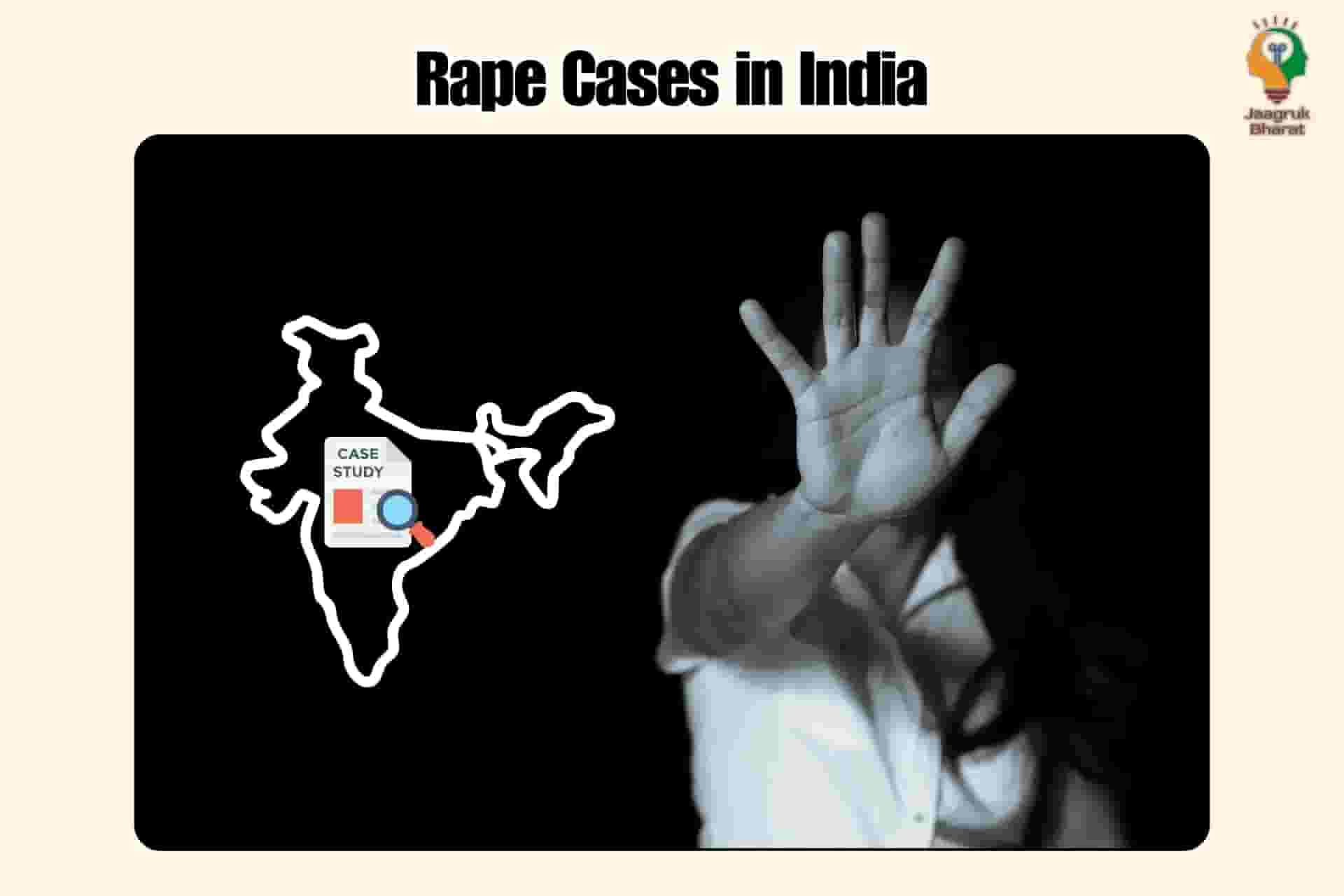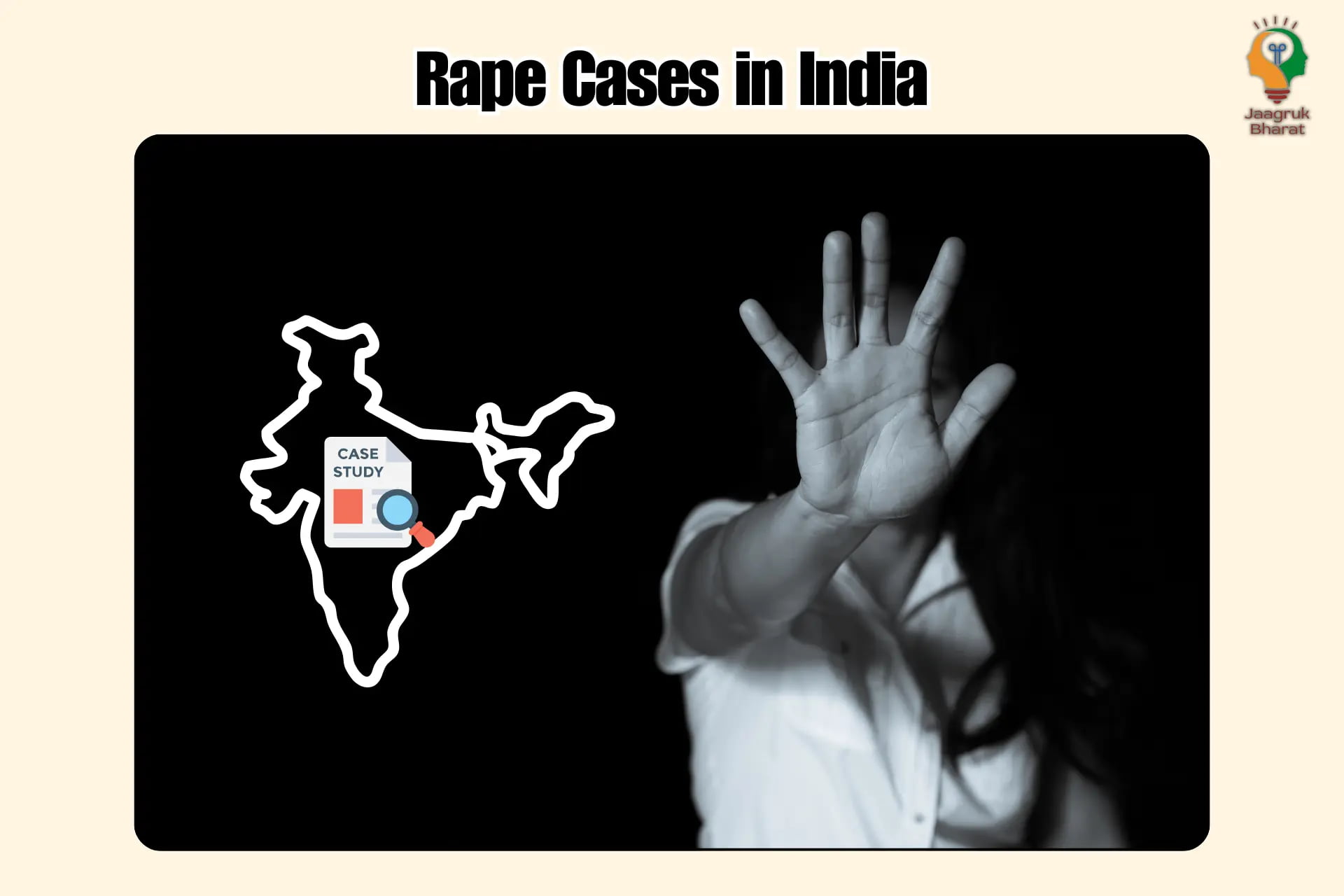Rape Cases In India - Statistics & State Wise Cases
Updated: 17-02-2026 at 3:30 PM
66k


“...in practise the standard for what constitutes rape is set not at the level of women’s experience of violation but just above the level of coercion acceptable to men.” ― Judith Lewis Herman
Over the last few decades, incredible growth has been seen in the country. From the launch of Digital India to making the nation a billion-dollar economy through the Atma Nirbhar Abhiyan (आत्मनिर्भर भारत अभियान). The problem is that the growth in India currently is like a double-edged sword.
Despite all the phenomenal growth, the violence against women India remains a thorn in our side. As per World Bank Data 2023, 48.4 per cent of the Indian population is female.
Read the article to learn about the hard-hitting reality of the crime against women in India, including information on laws against sexual violence India and women protection schemes India.
Read More: Beti Bachao Beti Padhao (BBBP) Scheme (बेटी बचाओ बेटी पढ़ाओ)
State-Wise Data For Reported Cases In India
After the notorious case of 2012, as per the National Crime Records Bureau (NCRB), the police are recording 25,000 rape cases every year in India. It was during the coronavirus pandemic that the number saw a sharp fall.
As per the NCRB report 2016, the number of cases reached around 39,000. As per government data, in 2018, on average, one woman reported a rape every 15 minutes in India. The latest recorded data is for the year 2022, which reported 31,000 sexual assault cases in India.
Let’s have a look at the latest data on violence against women:
| State-wise rape statistics India | Minor (Below 18) | Adult (18+) |
|---|---|---|
| Andhra Pradesh | 582 | 544 |
| Arunachal Pradesh | 63 | 39 |
| Assam | 1685 | 88 |
| Bihar | 729 | 1 |
| Chattisgarh | 1033 | 3 |
| Goa | 23 | 49 |
| Gujurat | 528 | 0 |
| Haryana | 1472 | 8 |
| Himachal Pradesh | 162 | 147 |
| Jammu & Kashmir | 212 | 11 |
| Jharkhand | 1228 | 188 |
| Karnataka | 505 | 0 |
| Kerela | 761 | 1262 |
| Madhya Pradesh | 2485 | 0 |
| Manipur | 26 | 10 |
| Meghalaya | 82 | 20 |
| Mizoram | 19 | 23 |
| Nagaland | 6 | 2 |
| Odisha | 1151 | 231 |
| Punjab | 576 | 426 |
| Rajasthan | 4685 | 1313 |
| Sikkim | 11 | 0 |
| Tamil Nadu | 353 | 9 |
| Telangana | 606 | 0 |
| Uttar Pradesh | 2895 | 270 |
| Uttrakhand | 342 | 184 |
| Maharashtra | 2299 | 0 |
| West Bengal | 1065 | 4 |
Read More: Mai Bhago Istri Shakti Scheme | India And Its Step Ahead On Equality
Women and girls constitute nearly half of the Indian population, who are always treated with respect and dignity. However, on the ground, the scenario is completely different, one that revolves around the horrendous crimes against the female faction of society.
Sexual violence and physical assault against women are rapidly increasing in India, with the Indian government trying every measure to curb this volcanic growth of numbers.
One such heartbreaking incident happened on August 9th, 2024, sending a wave of protest throughout the nation, with thousands of women participating in “Reclaim The Night” marches. This piece aims to make people aware of the horrific and vile truth of the status of women’s safety in India.
Government Schemes For Women Safety India
The government of India is working hard to acknowledge women’s safety-related problems and ways to strengthen women’s safety across the country. Some of the best women protection schemes India are listed below.
-
Women Helpline Scheme: The government of India has taken a step in the very same direction by increasing a security layer in the lives of women by launching the Women Helpline Scheme managed by the Ministry of Women and Child Development. The govt scheme is a part of a broader initiative of the National Mission for Empowerment of Women, which is aimed at ensuring that women feel protected no matter what time of the day or location it might be by introducing access to support and emergency services 24/7. Women can get the benefits under this government scheme at the tap of a button by calling the Women’s Safety toll-free number 181.
-
Ujjawala Scheme: The Ujjawala Scheme for victims of trafficking for sexual exploitation was launched by the Ministry of Women and Child Development under the Government of India. This govt scheme was launched in 2007 to put a full stop to the trafficking of women and children. The Ujjawala scheme is based on 5 pillars, which are its functions and goals: Rescue, Prevention, Rehabilitation, Re-integration and Repatriation.
-
Working Hostel Women Scheme: Through this initiative, the government aims to promote safe and reliable stay options and provide daycare facilities for female employees who stay away from home. The Working Hostel Women Scheme was launched in 1972 but has evolved with multiple reforms.
-
One-Stop Centre Scheme: According to a report by the National Crime Bureau, there were more than 4 lakh women who reported a case of violence against them. Violence against women comes in different forms, like domestic violence, sexual assault, honour killings, dowry-related abuse, acid attacks, and much more. To tackle this, the Ministry of Women and Child Development launched the Sakhi One Stop Centre Scheme on April 1, 2015, to provide support for women against the violence that they face.
What Do We Understand By The Term ‘Crime Against Women’?
As per the data from India’s National Crime Record Bureau (NCRB), in 2022 alone, about 90 rapes were reported every day in India. But these crime figures do not paint the entire picture. The actual data is likely to be more, as many such crimes go unreported due to the fear of societal backlash or the lack of faith in police investigation.
The sad part is that violence against women India comes in various forms. Rapes, dowry death, acid attack, kidnapping, honour killing, and harassment are a few that touch the news headlines.
The question is, why do we see such high numbers in a nation known for respecting women? The main reason is the male-dominated society. A major chunk of Indian women are limited to carrying out household activities and taking care of their families and husbands.
Another reason is the obvious relationship between poverty and violence in India. The lack of gender education and the treacherous path of justice make the situation worse.
Read More: The Nari Niketan Scheme
Steps To Make Women Feel Safe
The numbers we are witnessing are the reported cases; the actual data is still not on the ground level. A problem this big can only be solved through systematic change with the help of a multi-faceted approach.
Education from childhood and intervention at the home and community level are a must for a gender-transformative approach.
A gender-responsive approach can be done by engaging men and women together through various strategies.
Other ways that could make a difference are changing societal norms, improving policy and law, giving survivors a chance at a better life, creating nationwide campaigns, and educational workshops.
The government of India has taken various steps to make women feel safe. Initiatives like Mahila Shakti Kendra (महिला शक्ति केंद्र), One Stop Centre, Universalisation of Women Helpline, Ujjawala Scheme (उज्ज्वला योजना), and Mahila e-Haat are helping women feel empowered, equal, and secure.
Many civil societies, Self-Help Groups, ASHA workers, and more are playing a crucial role in awakening society to the hideous crimes of sexual assaults and violence.
Punishment For Rape In India
Rape is a crime. Not only on physical and universal levels, but also legally. It violates the victim’s fundamental right as per Article 21 of the Indian Constitution. Previously, the crime was under the provisions of sections 375 and 376 of the Indian Penal Code (IPC).
However, for a modern approach and to protect women from such heinous crimes, the Indian government introduced the Bharatiya Nyaya Sanhita, which replaced the long-standing law of IPC 1860, comprising various laws, including laws against sexual violence India.
As per BNS 2023, Rape comes under the provisions of Sections 63,64,65, 66, 67, 68, 69, and 70.
As per section 64, if a person commits rape, he shall be punishable for a term of not less than ten years, which can also extend to imprisonment for life, and shall be liable to a fine.
Section 65 of BNS highlights that if a person rapes a woman under 16 years of age, he shall be punished with imprisonment for a term of no less than 20 years, which can also extend to life in prison.
Section 66 of BNS highlights the offence of rape and causes the death of the woman or crime caused her to be in a vegetative state, then that person shall be punished with imprisonment for a term of no less than 20 years, which can extend to life in jail.
Section 67 of BNS highlights the non-consensual sexual intercourse between husband and wife, which is punishable by a term of imprisonment for not less than 2 years and may extend to 7 years.
Sections 68 and 69 of BNS talk about the crime committed by an authority person or a person who uses deceitful means, then the offence is punishable for a term of imprisonment not less than 5 years, which may extend to 10 years.
Section 70 of BNS highlights the offence of gang rape, which is punishable by a term of imprisonment not less than 25 years, which shall extend to life imprisonment.
Read More: The Aparajita Bill: An Anti-Rape Bill To Combat Sexual Violence
Conclusion
Even with such high punishment, crime is still roaring. It is time to get out and take the first step towards a better world. Women are allowed to feel safe, be it at work, on the road, in the neighbourhood, or at home. Educating yourself and the people around you will be the first step.
Stay safe, stay educated, and stay connected with Jaagruk Bharat as we are working day and night to bring awareness in society and make people realise that they have a voice, a chance, and the fundamental rights of humans.
Why Choose JB To Report CyberCrime?
At Jaagruk Bharat, we’re committed to helping you stay safe online. If you’ve been a victim, visit our Cyber Crime Complaint Page to report the incident and seek guidance. Our team ensures your complaint is directed to the right authorities with clarity and speed.
Frequently Asked Questions
2
0
66k
2
0
66k Views
0
No comments available





Our Company
Home
About
T&C
Privacy Policy
Eula
Disclaimer Policy
Code of Ethics
Contact Us
Careers
Cancellation & Refund Policy
Categories
Women
Insurance
Finance
Tax
Travel
Transport & Infrastructure
Food
Entertainment
Communication
Government ID Cards
E-commerce
Traffic guidelines
Miscellaneous
Housing and Sanitation
Sports
Startup
Environment and Safety
Education
Agriculture
Social cause
Employment
Disclaimer: Jaagruk Bharat is a private organization offering support for documentation and government scheme access. We are not affiliated with any government body. Official services are available on respective government portals. Our goal is to make processes easier and more accessible for citizens.
All Copyrights are reserved by Jaagruk Bharat